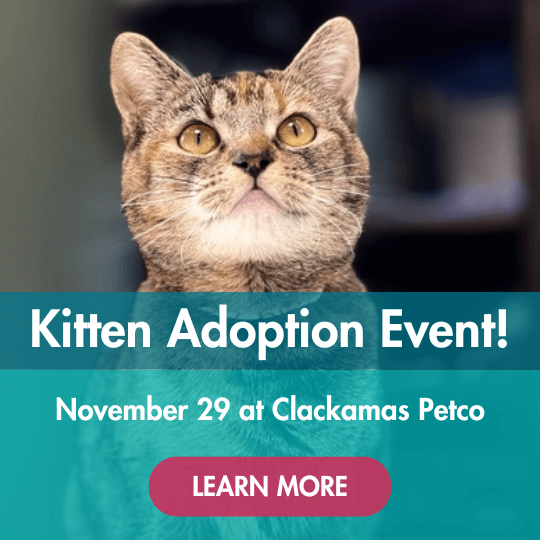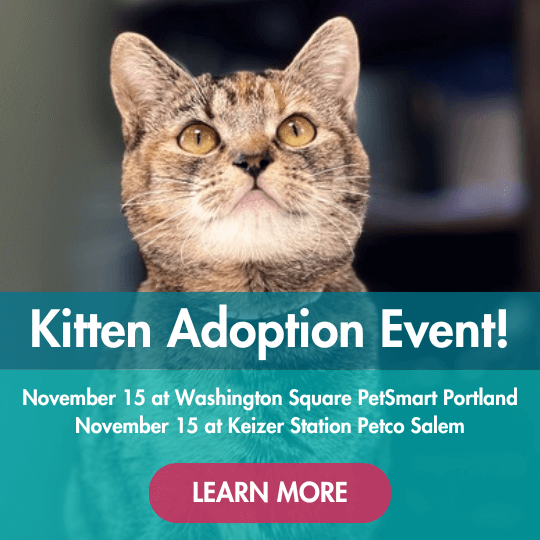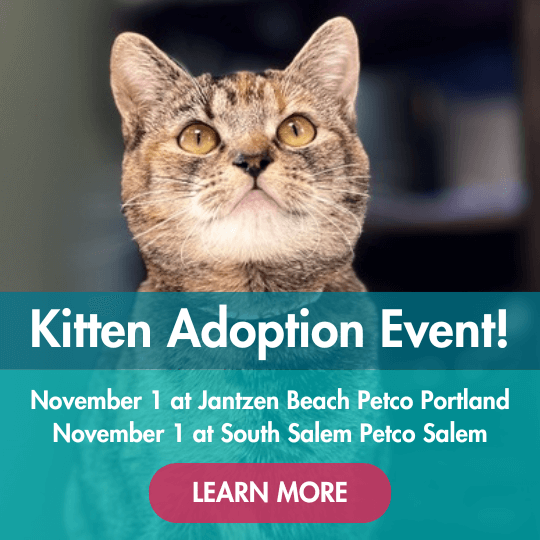What Should I Do When I Find Kittens?
We understand the instinct to want to swoop in and rescue a tiny kitten. Leading animal welfare organizations report that neonatal kittens are better off outdoors where they can be nursed and cared for by their mama. Shelters are no place for tiny kittens, whose immune systems are not strong enough to withstand the diseases they might be exposed to in the presence of new cats.
Gauge the age.
Depending on the age of the kitten, human intervention may harm the kitten’s chance of survival. Find out what you should do if you find a weaning kitten, or a kitten that is old enough to be separated from their mama.
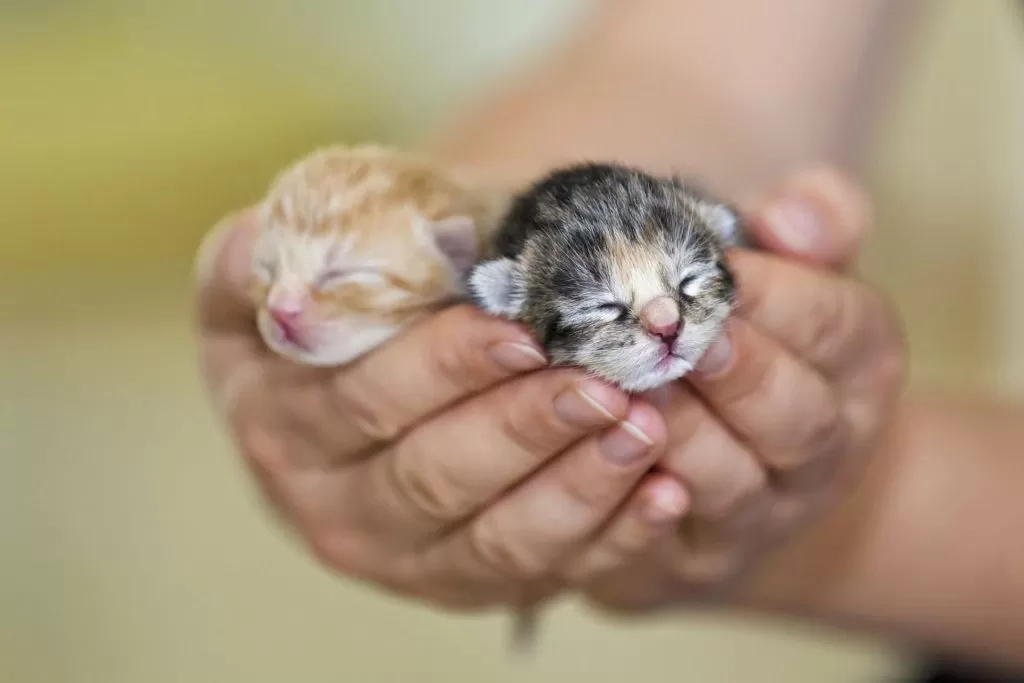
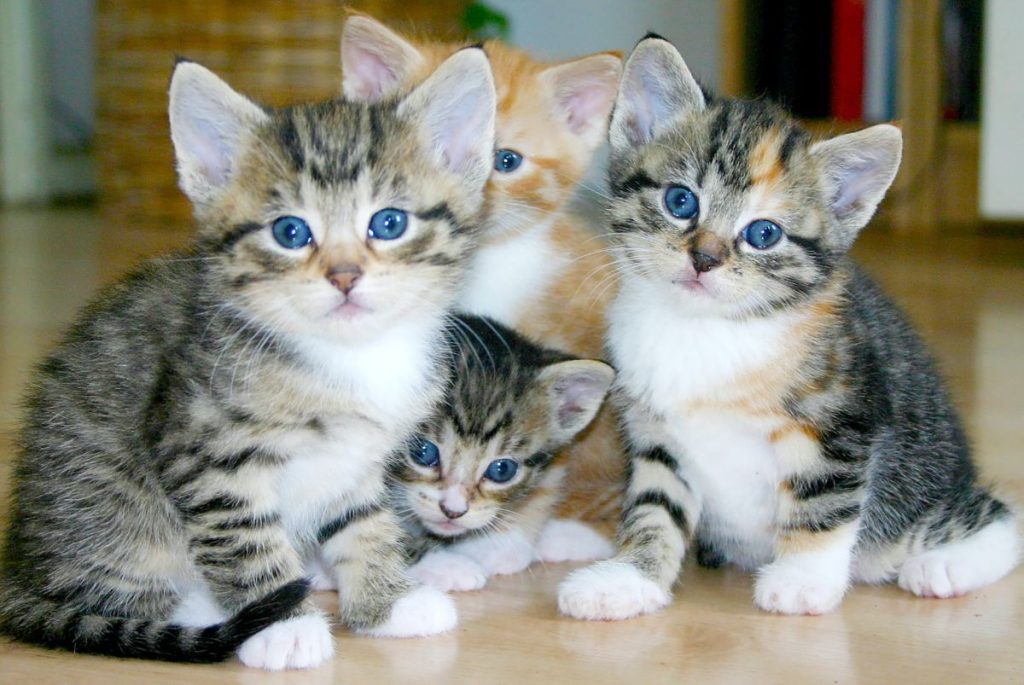
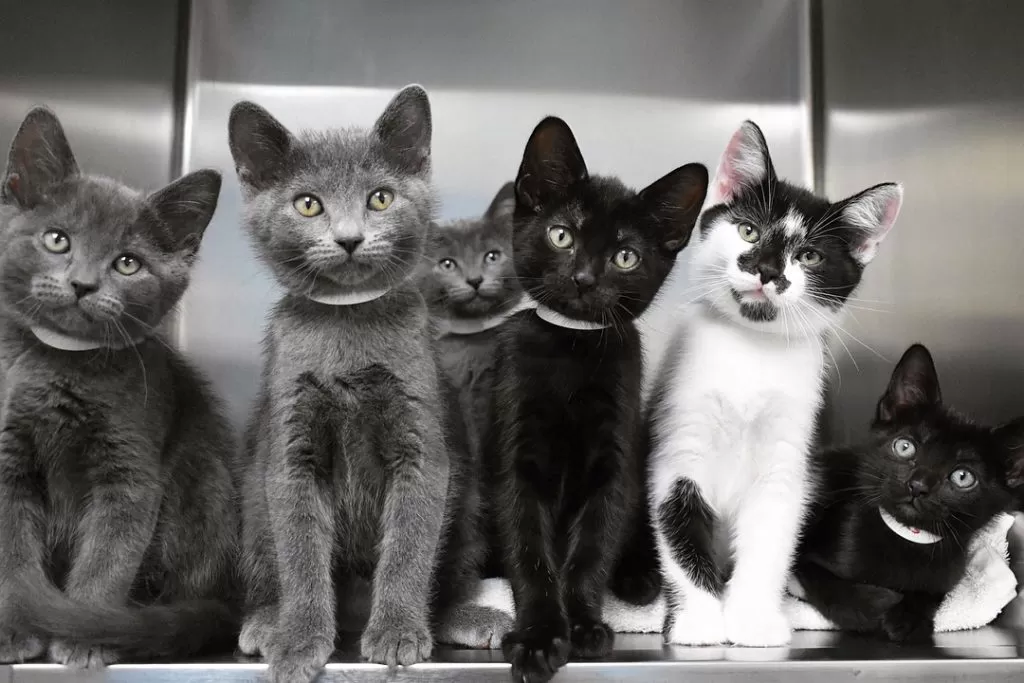
Kittens under two months of age are better off with their mama outdoors than in the shelter.
Observe to determine next steps:
- Are the kittens warm, clean and sleeping quietly? Wait and watch. Mom is likely caring for them.
- Do they appear to be dirty, crying, thin, or cold? They may need help. Monitor and prepare to act.
- Are they in a hazardous location (near traffic, unsheltered, exposed to known predators)? Gently move them to a safe, nearby spot and continue to observe.
If you don’t see the mama cat after observing for a few hours:
- Sprinkle flour around the nest to see any fresh paw prints of a mother cat who may be coming and going. Check it throughout the day.
- Do not place food near the kittens to lure mom, as it may attract other cats and predators!
When to step in:
- If you don’t see a mama cat caring for the kittens or they appear to be in rough or worsening shape after six or more hours of observation, then it may be time to step in.
- Kittens 5 weeks old or younger need consistent bottle feeding in addition to specialized care, like being kept warm as they’re too young to maintain their own body heat.
- Reach out to OHS or to the animal services agency in the county where you found the kitten(s) for help with how to provide care.
Kittens older than two months are weaned and ready to be trapped, neutered, and find loving families. Reach out to OHS or the animal services agency in the county where you found the kitten(s) to learn what resources are available to you.
Other ways you can help:
Provide the feline family with a water source, shade and/or shelter—such as a box on its side—and food.
What Should I Do When I Find a Cat?
Determine if the cat is injured or in immediate danger.
If the cat appears to be suffering with a life-threatening illness or injury, safely trap the cat and bring them to an emergency veterinary clinic. In Portland, DoveLewis Emergency Veterinary Hospital provides emergency medical care for injured stray animals. In Salem, OHS can accommodate walk-ins for injured and sick cats and kittens on a limited basis depending on available capacity and medical resources. We will do everything we can to alleviate an animal’s suffering.
If the cat is in immediate danger, such as by a busy road or stuck in a grate, gently move the cat to a safer location. If you need additional help with a cat in distress, contact the county where the cat was found to see what animal control services are available.
Determine if the cat is stray or feral.

Behaviors
- Social with people
- May have a history living with people
- Normally found alone
What to Do
It’s possible this cat is lost or an owned cat with indoor/outdoor access. The cat could also be a “community cat” who is cared for by a group of neighbors.
Ask around locally to see if anyone recognizes the cat. If you have no luck, bring the feline into a local veterinary clinic to scan for a microchip. If the cat isn’t microchipped, post their photo on social networks and flyers in your community, and also post to online forums:
- Petco Love Lost
- DoveLewis Lost & Found Database
- Portland Craigslist Lost & Found Pets
- HomeAgain
- NextDoor
- Lost Cat Finder
- Missing Pet Partnership
These links are provided as a resource only. These are outside organizations/companies, not affiliated with nor endorsed by Oregon Humane Society.
If no one in your community recognizes or claims the cat, as of late September 2025, friendly, unowned cats can be brought to animal welfare agencies to be adopted into homes after a minimum 3-5 day “hold” period. Read more about the guidelines created by House Bill 3604 here.
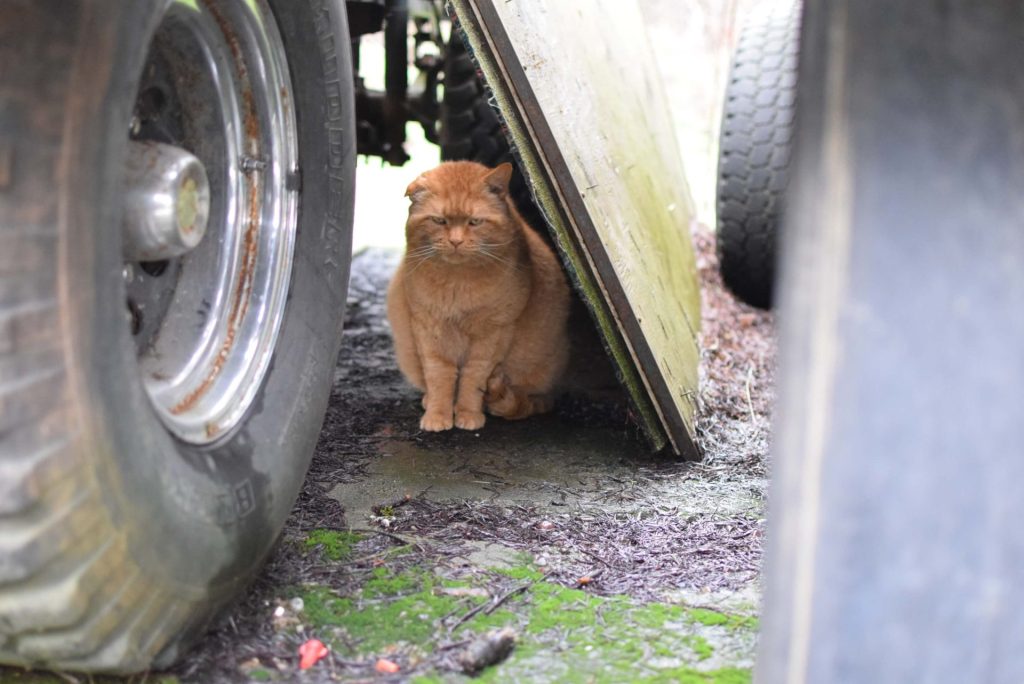
Behaviors
- Unsocial/fearful of people
- May have an eartip, meaning they have already been spayed/neutered
- Usually found in groups
What to Do
For cats who are not friendly or socialized around humans, we recommend contacting the Trap, Neuter, Return (TNR) group nearest you. They may be able to provide you with a trap to catch the cat or colony, as well as provide the spay/neuter surgery to prevent unwanted litters in the future.
The following organizations provide TNR services for feral cats.
County Contact Information
The handling of stray animals is a municipal function, meaning the responsibility falls on local municipalities to handle stray animals directly or contract with a qualified third party to provide the services. While HB3604 provides a statewide framework for agencies assisting stray cats, the cat intake process for community members who find cats still varies by county.
With few exceptions noted below, Oregon Humane Society is not a stray intake facility. Please note that our ability to intake animals is based on our current capacity, which can vary. This is why an appointment for any admission is required.
Clackamas County does not have a facility that accepts stray cats. OHS is able to accept sick or injured stray cats from Clackamas County on a limited basis. An intake appointment at OHS Portland Campus is necessary.
Clark County partners with Humane Society for Southwest Washington (HSSW) for animal services. Learn more here.
Marion County does not currently provide any sheltering or services for stray cats. OHS is able to accept stray cats/kittens and will prioritize those who are sick, injured or in immediate danger. An intake appointment at OHS Salem Campus is necessary.
Please note that OHS Salem Campus will be able to accommodate walk-ins for injured and sick cats and kittens on a limited basis depending on available capacity and medical resources. We will do everything we can to alleviate an animal’s suffering.
OHS has an agreement with Multnomah County Animal Services to accept sick, injured, or abandoned stray kittens under 12-weeks-old. An intake appointment at OHS Portland Campus is necessary.
Polk County currently has an agreement in place with OHS for assistance with stray cats and will prioritize those who are sick, injured or in immediate danger. An intake appointment at OHS Salem Campus is necessary.
OHS has an agreement with Washington County Animal Services and Bonnie Hays Animal Shelter to accept sick, injured, or abandoned stray kittens under 12-weeks-old. An intake appointment at OHS Portland Campus is necessary.
Have More Questions?
If you are unable to find assistance through the resources above, please contact our Community Resource Center, open seven days per week.
